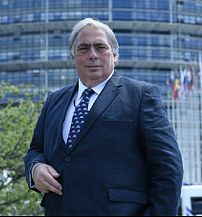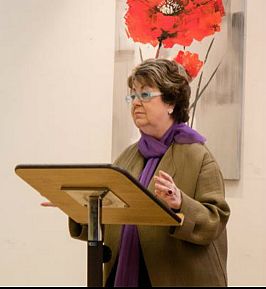"I can’t imagine any political party not being prepared," a UKIP MEP told Euronews.
With Brexit initially scheduled for March 29, the UK was never meant to take part in the European parliamentary elections.
 ADVERTISEMENT
ADVERTISEMENT
 ADVERTISEMENT
ADVERTISEMENT
But that deadline came and went, as did another one, and the UK remains an EU member state. Preparations to contest the May 23 ballot in Britain are now underway.
Most political parties across the bloc have already unveiled their lists and started campaigning in earnest. In some member states, like France, televised debates have already taken place.
British candidates have less than two months to do the same. So how do you put on a campaign in just six weeks?
You don’t. Well, not really.
‘Battleplan’
“We are currently putting the finishing touches to a manifesto to which preparation work started several weeks ago,” a spokesman for the Liberal Democrats told Euronews by email last week.
Every other major party contacted revealed a similar strategy.
Margot Parker, an MEP for the UK Independence Party (UKIP), said that the “battleplan” has been in place for a long time.
“It’s always been assumed that this (Brexit) would be very protracted, that you would have to have your plan B in place. I can’t imagine any political party not being prepared,” she added.
‘War chest’
Money also doesn’t appear to be an issue.
Electoral spending is closely monitored in the UK. Rules recently released by the Electoral Commission set the spending limits for the upcoming EU elections at £45,000 (€52,200) per candidate.
Fielding a full slate of candidates in England — where 60 seats are up for grabs — means each party could spend up to £2.7 million (€3.1 million).
“I have been involved in elections for the Conservative Party at one level or another for 40 years and there always seemed to be enough money to do what’s necessary,” John Flack, Conservative Party politician and MEP, told Euronews.
“I wouldn’t anticipate that it would be a particular problem this time,” he went on.
Parker revealed UKIP had a “war chest” ready to be tapped into, while the Lib Dems said it had contacted donors to build its own.
Remainers more energised
But parties may not need this much because interest in the ballot is, once again, fairly low.
A poll conducted by Hanbury Strategy for the Open Europe think tank, released on Thursday, found that only 35.2% of respondents were certain to vote in May — on par with 2014’s 35.6% turnout.
The Conservatives, in particular, are expected to fare pretty badly, coming a distant second with 23% of voting intentions behind Labour’s 37.8%.
That's because arch Brexiteers may vote for UKIP or the Brexit Party, which was founded by UKIP's former leader, Nigel Farage. In fact, 48.1% of Leave voters told the pollsters they were either likely or very likely to support Farage's party.
Remainers also appear to be much more energised. The poll found that 37.8% of Leave voters said they were 10/10 likely to vote, while 46.9% of Remain voters said the same.
'Going for the Remainer vote'
The Liberal Democrats, who have been championing a People's Vote or second Brexit referendum at the national level, hope to capitalise on that.
"We are very much going for those voters who are Remainers, pro-European, pro-People's Vote," the party's spokesman told Euronews.
He went on: "On top of that core vote, we will be focussing on pro-European, fed-up Tory and Labour voters, showing that we are the only vehicle for them to get behind to stand up for them in these elections."
For Julie Ward, a Labour MEP, the party could also benefit. Labour and its leader were heavily criticised in the months following the referendum for their ambiguous stance on the negotiations and what form the UK's future relationship with the EU should look like.
But it came out in favour of a soft Brexit earlier this year, demanding the country remains within the bloc's customs union and backing the idea of a second referendum.
"We need to make a patriotic case for the UK to stay in the EU and help shape progressive social policy for the benefit of the many, not the few," Ward wrote in an email to Euronews.
To do that, Ward hopes the party will "work more closely with student unions and young organisations. Young people who could participate in the 2016 referendum were overwhelmingly in favour of remaining in the EU."
'Fake news and misinformation'
But while the strategies have been laid out, the candidates lined up and the money secured, six weeks remains a very tight schedule to campaign and drum up support.
“I guess the main challenge will be what they have always been — such as the mainstream media’s obsession with Farage and his mates and the lack of exposure given to a broad range of candidates,” Ward argued.
“There is also the issue of fake news and misinformation — propaganda against the EU emanating from third countries such as Russia,” she added.
UKIP’s Parker put social media at the core of her campaigning but she said: “I worry about the interference.”
“None of this necessarily helps during an election campaign that is taking place throughout the EU. There’s an element of negativity, when a member state, the first, leaves the EU.”
'Whether for one month or nine'
Of course, all the money and efforts might very well be for nothing. UK lawmakers could approve the Withdrawal Agreement by May 22, negating the need for the country to even take part in the elections.
Or they could ratify it before July 2 — when MEPs return to parliament — in which case the newly-elected British lawmakers will simply not take their seats.
And even if the new extension to October 31 were to run its course, those 73 British MEPs will only have a job for four months, not nearly enough time to influence decision-making, have much of an impact or make their voices heard.
However, Ward said that "this isn’t about one’s career or personal ambition, this is about an ongoing process to protect jobs and the economy, to promote a social Europe of peace. If you believe that the soul of Europe is worth fighting for, you will campaign regardless of the uncertainty,."
Over in the Conservative camp, Flack took the same line, saying that although he’s "campaigned for Brexit before the term was even coined", he "passionately believes that while the UK is still in the EU, whether for a month, nine months or five years, we need to robustly promote the UK’s interests within the EU."
'Let's make the best of it'
But EU fears, stoked by arch Brexiteer Conservative MP Jacob Rees-Mogg — who suggested on Twitter that the UK should be as obstructive as possible if they were forced to take part in EU elections — were dismissed.
"We’re looking for a conciliatory process here," UKIP’s Parker said.
She continued: "It’d be better if we didn’t have to go through it but if we do, we must do it in a very honourable, straightforward way so that people know they can trust us to play the role we have to play until the right conclusions or the finishing line or the acceptance of the agreement are ratified and we can move on."
Ditto for Flack, who described Rees-Mogg’s suggestion as "quite counter-productive."
"Politics is the art of the possible and while we’re in (the EU), while we’re part of it, let’s damn well make the best of it."
Euronews also contacted the Brexit Party and the Greens for comment.













